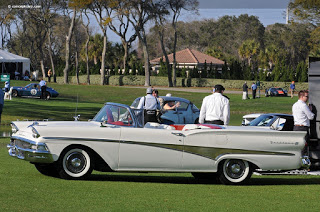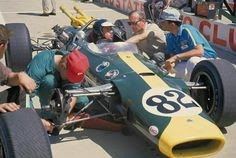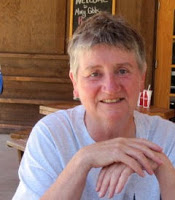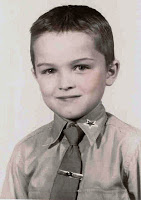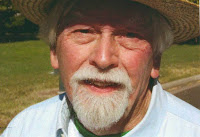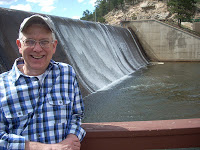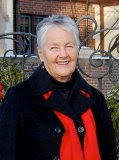True Colors, by Lewis Thompson
Flowers, by Gillian
raised in England. After graduation from college there, I moved to the U.S.
and, having discovered Colorado, never left. I have lived in the Denver-Boulder
area since 1965, working for 30-years at IBM. I married, raised four
stepchildren, then got divorced after finally, in my forties, accepting myself
as a lesbian. I have been with my wonderful partner Betsy for thirty-years.
We have been married since 2013.
Quirky Domestic Tidbits, by Ricky
Mothers Day Take Five, by Ray S
I Don’t Know, by Phillip Hoyle
time writing, painting, and socializing. In general, he keeps busy with groups
of writers and artists. Following thirty-two years in church work and fifteen
in a therapeutic massage practice, he now focuses on creating beauty. He
volunteers at The Center leading the SAGE program “Telling Your Story.”
The Tragic Myth of Niobe, by Louis Brown
the most memorable Greek myths, for Niobe’s story features a striking example
of the consequences of hubris, a Greek term defined as arrogance or excessive
pride. This myth was popular in ancient literature, poetry and art. Therefore,
it is not a surprise that the legend of Niobe appears in one of our oldest and
best sources for Greek myths, the Iliad of Homer.
was Tantalus, king of a town above Mount Sipylus in Anatolia, but we do not
know exactly who her mother was. Niobe had two brothers, Broteas and Pelops,
who would later be a legendary hero and would give his name to Peloponnese.
When Niobe grew up, she got married to Amphion, king of Thebes. This was a
turning point in her life and a series of tragic events followed, to give her a
distinct place in one of the most tragic dramas in Greek mythology. Niobe and
Amphion gave birth to fourteen children, seven sons and seven daughters.
crime at a ceremony held in honor of Leto, the mother of the divine twins,
Apollo and Artemis, who was also living in Thebes, Niobe, in a fit of
arrogance, bragged about her fourteen children. In fact, Niobe said that she
was superior to Leto, as she had fourteen children and not only two. When the
twins knew this insult, they got enraged and at once, came down to Earth to
kill the children of Niobe. Apollo, the god of light and music, killed all
seven of Niobe’s sons with his powerful arrows in front of their mother’s eyes.
Although Niobe was pleading Apollo to feel mercy for her last surviving son,
Apollo’s lethal arrow had already left his bow to find its mark with deadly
accuracy, thus wiping out all the male descendants of Niobe.
nature and hunting, killed Niobe’s seven daughters with her lethal arrows and
their dead bodies were lying unburied for nine days. Turning into a rock, devastated by the slaughter of his children, Amphion committed suicide. Some
versions say that he too was killed by Apollo when he tried to avenge his
children’s deaths. And so it was that Niobe’s entire family had been wiped out
by the gods in a matter of moments, and in deep anguish, she ran to Mount
Sipylus.
[put] … an end to … her pain. Zeus felt sorry for her and transformed her into a
rock, to make her feelings [express themselves from the] … stone. However, even
as a rock, Niobe continued to cry. Her endless tears poured forth as a stream
from the rock and it [her statue] seems to stand as a moving reminder of a
mother’s eternal mourning. To this day, Niobe is mourning for her children and
people believe that her faint image can still be seen carved on a limestone
rock cliff on Mount Sipylus, with the water that seeps out of the porous rocks
bearing a strong allusion to her ceaseless tears.
tale of Niobe centered on the consequences of hybris, a strange concept in the
Greek antiquity, which said that, if you act with arrogance towards the Gods,
then you will be punished. Actually Niobe’s story is a classic example of the
wrath of gods against human weaknesses and has been beautifully narrated in
Homer’s Iliad. The tale of Niobe also finds mention in Metamorphoses, a
narrative poem, written by the renowned Roman poet Ovid, who, however, has
inverted the traditionally accepted order and portrayed the desires and
conquests of the gods with aversion, while elevating human passions to a higher
Source:
Bruce Springsteen
could, I surely would,
Stand on the rock where Moses stood, Pharoh’s army got drownded,
Oh Mary don’t you weep.
Oh Mary don’t you weep no more,
Oh Mary don’t you weep no more,
Pharoh’s army got drownded,
Oh Mary don’t you weep.
Well Mary wore three links of chain,
On every link was Jesus name,
Pharoh’s army got drownded,
Oh Mary don’t you weep.
Oh Mary don’t you weep no more,
Oh Mary don’t you weep no more,
Pharoh’s army got drownded,
Oh Mary don’t you weep.
Well one of these nights about 12 o’clock,
This old world is gonna rock,
Pharoh’s army got drownded,
Oh Mary don’t you weep.
Well Moses stood on the Red Sea shore,
Smote the water with a two by four,
Pharoh’s army got drownded,
Oh Mary don’t you weep.
Oh Mary don’t you weep no more,
Oh Mary don’t you weep no more,
Pharoh’s army got drownded,
Oh Mary don’t you weep.
Well old Mister Satan he got mad,
Missed that soul that he thought he had,
Pharoh’s army got drownded,
Oh Mary don’t you weep.
Brothers and sisters, don’t you cry,
There’ll be good times by and by,
Pharoh’s army got drownded,
Oh Mary don’t you weep.
Oh Mary don’t you weep no more,
Oh Mary don’t you weep no more,
Pharoh’s army got drownded,
Oh Mary don’t you weep.
God gave Noah the rainbow sign,
No more water, but fire next time,
Pharoh’s army got drownded,
Oh Mary don’t you weep.
Oh Mary don’t you weep no more,
Oh Mary don’t you weep no more,
Pharoh’s army got drownded,
Oh Mary don’t you weep.
Pharoh’s army got drownded,
Oh Mary don’t you weep,
Oh Mary don’t you weep no more,
Oh Mary don’t you weep no more.
Pharoh’s army got drownded,
Oh Mary don’t you weep.
of tears (Latin vallis lacrimarum) is a Christian phrase referring to the
tribulations of life that Christian doctrine says are left behind only when one
leaves the world and enters Heaven. The term “valley of tears”
is also used sometimes. (Wikepedia).
Amadeus Mozart. His Lacrimosa (weeping) is part of his Requiem Mass 1792. Was
completed by Sysmayr.
Me a River
you say you’re lonely
You cry the whole night through
Well, you can cry me a river, cry me a river
cried a river over you.
you say you’re sorry
For being so untrue
Well, you can cry me a river, cry me a river
cried a river over you
drove me, nearly drove me out of my head
While you never shed a tear
Remember, I remember all that you said
Told me love was too plebeian
me you were through with me
And now you say you love me
Well, just to prove you do
Come on and cry me a river, cry me a river
cried a river over you
You drove me, nearly drove me out of my head
While you never shed a tear
Remember, I…
the Author
Queens County. I still commute there. I worked for many years as a Caseworker
for New York City Human Resources Administration, dealing with mentally
impaired clients, then as a social work Supervisor dealing with homeless PWA’s.
I have an apartment in Wheat Ridge, CO. I retired in 2002. I have a few
interesting stories to tell. My boyfriend Kevin lives in New York City. I
graduated Queens College, CUNY, in 1967.
Pushing the Buttons, by Lewis Thompson
back in 1960, we did our on-the-road learning in a 1957 Mercury Monterey with
push-button automatic transmission controls mounted to the left of the steering
column on the lower instrument panel. (Most
people over 60, like me, associate push-button shifting with Chrysler
Corporation vehicles.) Mercury went back
to column-mounted shifting a year or two later.
I assume that a few too many of their customers were downshifting or
upshifting when they meant to change the radio station from WLS in Chicago to
KOMA in Oklahoma City.
models, pushing a button is how you start the motor, either gasoline or
electric. Many of us will remember when
you would push a button to lock the car doors.
Later models often lock the doors for you when the vehicle reaches a
certain speed. One operation that hasn’t
changed much is the need to push a button to release the lap/shoulder
belt. Many telephones still require the
manual dexterity to push a button to dial or take a call but they are rapidly
being phased out by phones that require only a soft, tactile touch to a screen.
operated door bells, light switches, tape recorders, adding machines,
typewriters, office phones, air conditioners, electric mixers, car radios,
switch blade knives, and pagers. Some
household items still use pushbuttons today.
For example, pop machines, cell phones, elevators, pedestrian crossing
signals, car key fobs, and apartment lobby call boxes. Almost everything else has converted to a
modus operandi that does not involve buttons.
letting their fingernails grow so long that they can no longer push a button
without breaking a nail. Broken nails
used to be a problem for women who wore nylon stockings. However, since woman don’t wear nylon
stockings anymore–they went out of style concurrently with buttons–broken
nails are no longer an issue unless they make it hard to make the desired
selection on a touch screen or micro-switch.
I don’t know if this is a problem since I still have many possessions
with a button. Therefore, pushing buttons
is a push-over for me.
the Author
beautiful state of Colorado out of my native Kansas by way of Michigan, the
state where I married and had two children while working as an engineer for the
Ford Motor Company. I was married to a wonderful woman for 26 happy years and suddenly
realized that life was passing me by. I figured that I should make a change, as
our offspring were basically on their own and I wasn’t getting any younger.
Luckily, a very attractive and personable man just happened to be crossing my
path at that time, so the change-over was both fortuitous and smooth.
retired and we moved to Denver, my husband’s home town. He passed away after 13
blissful years together in October of 2012. I am left to find a new path to
fulfillment. One possibility is through writing. Thank goodness, the SAGE
Creative Writing Group was there to light the way.
Rejoice, by Gillian
Rejoice, Emmanuel shall come to thee, O Israel”
when I accompanied my mother to church most Sundays, I loved that hymn. It was
sung with much more gusto than most of the hymns. It felt that we truly were
offering a joyful noise unto the Lord. In my reedy little five-year-old voice I
belted out the admonition to rejoice, rejoice, along with the adults.
clue why we were rejoicing. Who was Emmanuel and why was he about to get
together with Israel, whoever he was? It didn’t matter. Singing that hymn made
me feel happy; all good inside After services in which it was the final hymn, I
always felt like skipping and laughing all the way home.
often it was sung in our little church. Our congregation was much too small to
enjoy the luxury of a choir to guide us. All hymns, if I remember correctly –
something of a big ‘if’ – came from the Church of England book of Hymns Ancient
and Modern, published in 1862. I checked on line and it apparently contained
779 hymns. Now that should have been enough to save us from too much
repetition; but that was not the reality. We seemed to have a small group of
twenty or so tried-and-true favorites, which cropped up regularly with an
occasional little-used one tossed in to keep us on our toes. My mother hated it
when these strangers appeared as it meant she had to practice. She played the
church organ and knew the old favorites by heart, so they required little
effort on her part. She also disliked’ the unfamiliar because the congregation, fumbling with
unknown words and music, lagged behind the organ waiting for a lead, and
gradually the singing got slower and slower and lower and lower. The vicar, who
never sang along, simply shook his head sadly at the cacophony and vowed to
stick with the familiar the next Sunday. And the next.
because I associated the word with the hymn, ‘rejoice’ or ‘rejoicing’ always
represented to me something loud and jubilant; triumphant: the crowd on the
sidelines rejoicing when the home team scores a goal, the audience rejoicing at
the end of a particularly stirring symphony. This kind of rejoicing I rarely,
if ever, experienced. My family and friends were all rather quiet people who
might smile broadly at a win for the home team, but that was about as wild as
it might get.
understand that to rejoice, as the dictionaries state it, means to feel or show
great joy or delight. To feel or show. We can rejoice in silence, simply
to feel the joy within us, not expressing it with a sound; perhaps not even a
hint of a smile. That is my kind of rejoicing. In fact, I have rather come to
fear, or at least be uncomfortable with, the loud exuberant variety. Too
frequently no good will come of it. The raucous rejoicing at the end of the
soccer game ends up in fighting and even deaths. The screaming rah rah of
political rallies negates all rational thought, as does – sorry Emmanuel –
religious raving. Rejoicing loudly can perhaps be OK in a space, such as a
church, – OK Emmanuel, back at ya – where all there feel the same, but be very
combative when others present feel very differently.
silent inner rejoicing at the beauty of the sky, or a single leaf, or the touch
of a loved one or a smile from a friend.
brings me a joy that could never be deepened by shouting it from the rooftops.
the Author
raised in England. After graduation from college there, I moved to the U.S.
and, having discovered Colorado, never left. I have lived in the Denver-Boulder
area since 1965, working for 30-years at IBM. I married, raised four
stepchildren, then got divorced after finally, in my forties, accepting myself
as a lesbian. I have been with my wonderful partner Betsy for thirty-years.
We have been married since 2013.
My Most Meaningful Vacation, by Betsy
a vacation meaningful anyway? I can’t honestly think of any vacation that I
have ever taken that was not meaningful. Some maybe were more meaningful than
others that is definitely true. I will have to focus on vacations of the last,
say, 50 years. Choosing from all the vacations of my lifetime is too
overwhelming. My memory just isn’t that good.
abroad—the heart of Europe as well as remote places like the Orkney Islands off
the north coast of Scotland, the train trip through South Africa, plus visits
to Canada, Mexico, and Central America. All these trips were memorable and
certainly meaningful. Simply experiencing other cultures, and other ways of
life is about the best educational experience a person can have. We learn from
living among or simply observing others that our way is not the only way. Our language is not the only language, our
humor is not the only kind of humor, our
cuisine is not the only kind.
vacation is an exploit filled with excitement, new experiences, and
adventure. I have traveled on vacation
by plane, train, boat, car, bicycle, and on foot. One of my most memorable
“vacations” was cycling across the United States, from Pacific to Atlantic. I
have written several stories about that trip which I took in 2005.
by bicycle is that you see so much more detail along the way, including the
wild life, sometimes in the form of road kill.
vacations have been of the camping variety. I love camping whether in the
wilderness or just off the highway.
Bill and the three children were young, we used to take back packing trips.
Bill was always looking for fishing opportunities. I hated fishing. Not enough
action. But there was plenty for all of us to do on those adventures while Bill
was fishing. I very much enjoyed the hiking, setting up camp, and being in the mountain environment with
nature.
together we went back packing one summer in the Wind River Range in
Wyoming. That was the time she cut a
gash in her knee and I saved her from bleeding to death with my Girl Scout
first aid kit which happened to have some butterfly bandages in it. She still
has a scar on her knee today which I want to pass around the table for all of
you to see.
vacations together, could have been meaningful in that it had the potential for
being our last vacation together. But
Gill stuck with me in spite of the fact that it was not her idea of a vacation.
I actually think it was the butterfly bandages that saved our relationship.
together a short time, we went to a style of camping more to her liking—car
camping. Gill had a VW camper van—a Westphalia— in which we had taken some day
trips during our courtship. It may not have been an actual vacation, rather a
weekend, when we took the Westy to Rocky Mountain National Park. This was a
meaningful trip to me, and I will never forget it. It definitely portended of a
meaningful ritual which would become a part of my life everyday for the rest of
my life. We were driving along through the park admiring the sights when Gill
pulled over off the road and came to a stop. “It’s tea time,” she wailed. She
jumped into the back, opened the galley,
put the kettle on and brewed the tea, and served me a dainty cup of
perfect British tea—with milk, of course, not cream. I am a person who likes structure and some
rituals. So I became hooked on four o’clock tea time for life.
enamored of the idea of a camper van for road trips. The Westy was very old and
worn out and had to go soon after we started living together. But we both were
enthusiastic about having a camping vehicle. So a few years after selling the
Westy we bought a used VW Eurovan—a later model of the Westphalia. We named her Brunie, short for Brunhilda. She
was a big boned woman. The three of us —Gill, Brunie, and I—spent 13 years together, travelled over 200,000 miles
in too many trips to count. It was an awesome relationship. All of our
vacations together were meaningful because we traveled in almost every state,
except Hawaii and Alaska, always had a comfortable place to sleep, we felt
safe, and were always warm and dry. Because of Brunie we saw the country, we
learned history and geology, we experienced things and places we never dreamed
existed. I might add we met all kinds of people who would always approach us in
the campground wanting to meet us? No wanting a look at Brunie.
places we visited had been selected as a destination like the national parks,
state parks, oceanside settings, historical sites, desert oases. Others we just happened upon by chance.
We always kept a diary on these trips because we knew as we grew older
we would forget where it was that we saw that amazing sunrise, that moose
grazing beside the road, those sheep on the cliff above, that approaching
tornado. Or all we had, learned, heard, and experienced would become blurred. And Gill was constantly snapping photos, so
we have thousands of those to remind us. Some places were quite ordinary, some
elaborate, some filled us with awe, some sights were beautiful beyond
imagination, some curious, but not one was not worth the visit. Some of our
favorite, nearby places we have been back to several times such as
Hovenweep, Canyon lands, Hamburger Rock, Arches N.P., and Yellowstone.
trip or sojourn that was not meaningful.
Most meaningful? Impossible to say.
the Author
the GLBT community including PFLAG, the Denver Women’s Chorus, OLOC (Old
Lesbians Organizing for Change), and the GLBT Community Center. She has been
retired from the human services field for 20 years. Since her retirement, her major
activities have included tennis, camping, traveling, teaching skiing as a
volunteer instructor with the National Sports Center for the Disabled, reading,
writing, and learning. Betsy came out as a lesbian after 25 years of marriage.
She has a close relationship with her three children and four grandchildren.
Betsy says her greatest and most meaningful enjoyment comes from sharing her
life with her partner of 30 years, Gillian Edwards.

